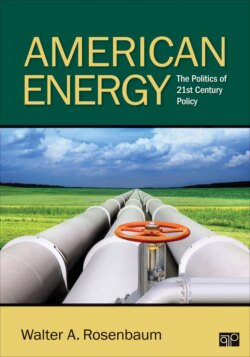Читать книгу American Energy - Walter A. Rosenbaum - Страница 6
На сайте Литреса книга снята с продажи.
Preface
ОглавлениеNot too long ago, the mayor of a small Louisiana parish reflected upon the sudden prosperity that seemed almost miraculously to attend some of his neighbors. The lucky ones, he observed, “went to bed one night poor and woke up the next day rich, enabled to buy a Cadillac and pay cash … It was kind of like the show The Beverly Hillbillies. Parish homeowners, he said, could typically earn “signing bonuses of $350 to as much as $30,000 an acre from gas companies, as well as royalties that can last for decades.”i
i Clifford Krauss and Tom Zeller, Jr., “When a Rig Moves In Next Door,” New York Times, November 7, 2010, BU:1.
This prosperity has a name. It is shale oil “fracking,” a technology rapidly altering state and local economies across America, about which much will be said in coming chapters. Fracking is an example of what an increasing array of energy experts believe to be a remarkable and compelling change underway across the US energy economy. This book concerns this transformation and its impact upon America’s traditional governance of its vast energy resources. Because this change is forcing a rethinking and revision of American energy policy, this narrative has two interrelated themes. The discussion gives necessary attention to traditional foundations of national energy policy, such as energy taxes, subsidies, environmental and market regulation. The narrative also focuses in every chapter upon recent technological innovations and economic events reshaping, sometimes profoundly, the substance of current energy policy—technical innovations, such as fracking and wind farms, or economic transformations, such as the recent surge in US energy exports.
There can be uncertainties, of course, when riding the wave of predictions about America’s changing energy future now increasingly frequent among energy professionals and policymakers—experts can miscalculate. However, the early evidence of many predicted changes in America’s energy economy is already apparent; it compels the attention of current energy policymakers and requires recognition in any interpretation of current US energy politics and policy.
These important transformations in the American energy economy are “remarkable” in several respects. The change has been so recent that a book written about contemporary US energy policy only a few years ago would now be surprisingly outdated. The changes underway are also notable for the anticipated scope of their impact. The decision of the Obama administration in 2011 to move ahead aggressively with regulation of domestic CO2 emissions from electric utilities, for instance, is predicted to alter the long-term economic future and market competitiveness of the domestic coal and natural gas industries.
The reader will note the interplay between themes of change and continuity in each of the following chapters, which focus upon American energy governance in different perspectives. The first chapter introduces institutions, actors, and settings essential to understanding the US energy policymaking process. Chapter 2 is a concise “primer” describing traditional policy instruments commonly encountered in energy governance. The following four chapters explore current politics and policy issues in four important energy domains: petroleum and natural gas, coal, nuclear energy, conservation and electric power. Each of these chapters has a common format:
The Energy Source: Its Significance and Changing Status
Currently Significant Resource Policies and Politics
Contending IssuesFlashpoints of Current ControversyPolicy Alternatives
The final chapter, 7, explores important issues arising from US engagement in the global energy marketplace.
I am indebted to my reviewers and editors for their very important contribution to the creation and writing of this book and herewith absolve them of any responsibility for mistakes of commission or omission which— alas!—are my own. My able reviewers include: Christopher Burdett, Virginia Commonwealth University; Fred Curtis, Drew University; Greg Gangi, University of North Carolina, Chapel Hill; Marjorie Randon Hershey, Indiana University; Susan Hunter, West Virginia University; W. Henry Lambright, Syracuse University; Robert Lifset, University of Oklahoma; Daniel Press, University of California, Santa Cruz; and Allan Stoekl, Pennsylvania State University. The very helpful editorial oversight and chapter preparation were provided by Charisse Kiino, Davia Grant, Stephanie Palermini, and Patrice Sutton. Oh, yes, a word of appreciation to my two cats, Karma and Dharma, who purred contentedly at my side, looking absolutely confident about my ability, while I struggled many an hour for the proper ideas and the right words for the following narrative.
